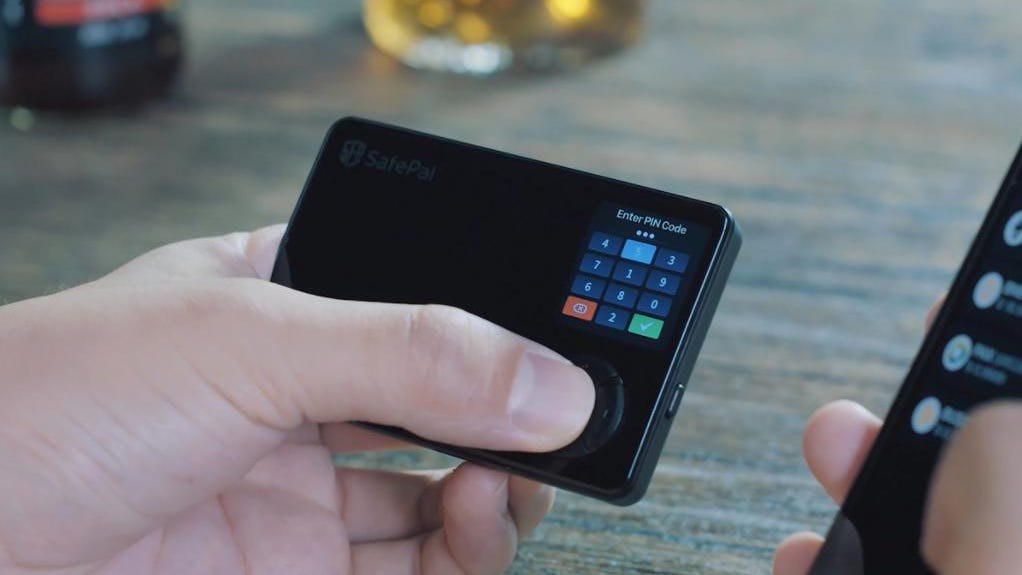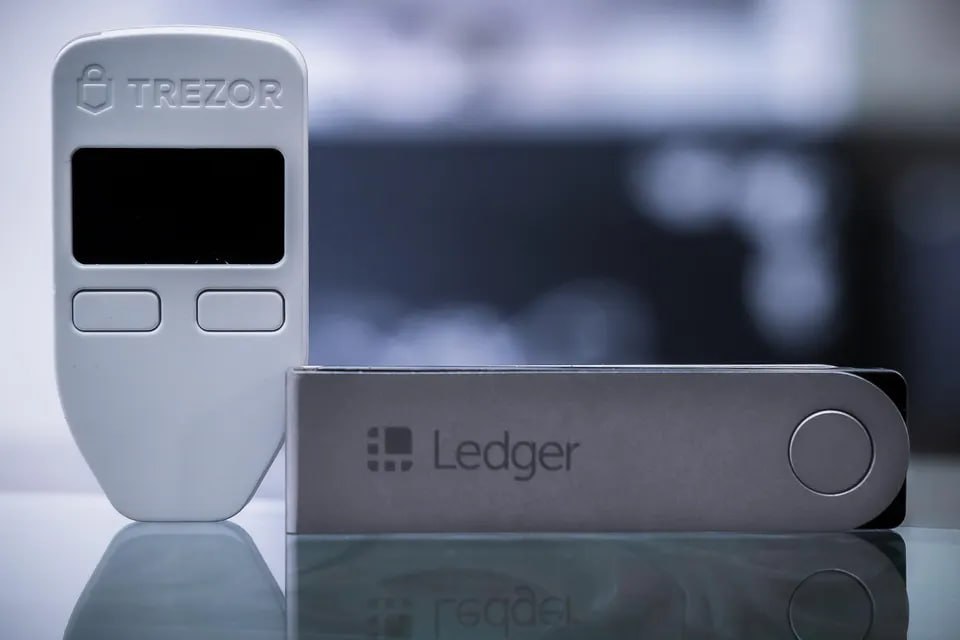Welcome to the digital world of cryptocurrencies, where managing digital assets is as important as purchasing them. In this digital realm, crypto cold wallet plays a significant role. Cryptocurrencies' successful use and safekeeping depend on how and where you store them. Cryptocurrency storage refers to the methods used to store the private keys of your crypto. These keys are information used to authorize transactions and access the cryptocurrency address. If these keys are lost, the related cryptocurrencies are lost forever. Therefore, you must store these keys securely. There are primarily two cryptocurrency storage types: hot and cold. Hot storage refers to a wallet connected to the internet and susceptible to online attacks. On the other hand, cold storage or a cold crypto wallet refers to storing cryptocurrencies in a place that is not connected to the internet.
What Is A Crypto Cold Wallet?
A crypto cold wallet is a way to store and secure your cryptocurrencies offline. This storage method is considered the safest way to store your digital assets as it reduces the risks associated with online storage, such as hacking and theft. Cold wallets can be hardware devices, paper wallets, or metallic coins. The common feature of these storage methods is that they store the private keys of your cryptocurrencies offline. This feature means that your cryptocurrencies are not exposed to internet-associated risks. Imagine your cold wallet as a bank vault where digital assets are stored securely. Unlike hot wallets, like checking accounts, cold crypto wallets function like savings accounts. They are not meant for frequent transactions but for secure, long-term storage.
How do Cold Wallets Work?
Cold wallets, also known as cold storage, are a secure method for storing cryptocurrencies like Bitcoin. Unlike hot wallets, which are connected to the internet and are more vulnerable to hacking, cold wallets operate offline. They work by keeping the private keys needed to access and manage your cryptocurrency in a completely isolated environment. The two main types of cold wallets are hardware wallets and paper wallets. Hardware wallets are physical devices designed to store private keys securely. They generate and sign transactions offline, ensuring that your keys never touch an internet-connected device. Paper wallets, on the other hand, involve printing the private and public keys on a physical piece of paper. As long as this paper is kept safe from physical harm and secure from unauthorized access, your cryptocurrency remains protected. Cold wallets provide a higher level of security and are less susceptible to online threats like hacking, malware, and phishing attacks. However, they do require responsible handling and safekeeping to prevent physical loss or damage. Users often choose cold wallets for long-term storage of their cryptocurrency assets, while keeping smaller amounts in hot wallets for day-to-day transactions.
The Importance of the Crypto Cold Wallet
In the world of digital currencies, security is paramount. Cold wallets provide this much-needed security by offering offline storage. They protect your private keys from online threats and offer peace of mind. Crypto cold wallets also give you total control over your cryptocurrencies. You don't need to rely on third-party services, which could be compromised or go out of business. You hold your private keys, and therefore, you are the sole owner of your digital assets. Furthermore, cold wallets offer flexibility. They can store multiple cryptocurrencies, making them an excellent choice for those with different digital assets. They are also portable, allowing you to carry your cryptocurrencies anywhere.

Types of Crypto Cold Wallet: Cold Storage Options
Secure digital asset storage is paramount in cryptocurrency's vast, bustling world. The sphere of crypto wallets is diverse, but as you have read, they can be sorted into two main categories - hot wallets (online) and cold wallets (offline). Two types of cold wallets are popular: Hardware Wallets and Paper Wallets. Let's delve into these two cold storage methods to understand how they work and why they are considered secure.
Hardware Wallets: Physical Security for Digital Assets
Hardware wallets have earned a reputation as a high-security way to store cryptocurrencies. Unlike hot wallets, they are physical devices, often resembling USB drives, which store private keys offline. This storage method, also known as 'cold storage,' allows the wallet to stay disconnected from the internet, thus reducing the chances of online hacks. These wallets are equipped with impressive security features. Private keys are stored in a protected area of the device and cannot be transferred out of the device in plaintext. This feature makes hardware wallets immune to computer viruses that steal from software wallets. With PIN codes and encryption, the wallet ensures the safety of your assets, even if the device is lost or stolen.
Paper Wallets: Simplicity Meets Security
On the other hand, Paper Wallets take the concept of 'offline storage' to a new level. They involve printing or writing down private keys on paper, thus providing an entirely offline method of storing digital assets. Some even opt for engraving these keys onto metal sheets to make them water and fireproof. While the idea might seem archaic in the digital age, paper wallets offer solid security by keeping your private keys wholly offline and safe from digital threats. Your assets are secure if the paper or metal sheet is kept safe. However, they require careful handling to prevent physical damage or loss. Both hardware and paper wallets provide robust security measures for storing cryptocurrencies. Their choice largely depends on personal preference, convenience, and the amount of crypto one needs to store. Regardless of choice, keeping your private keys secure is essential because, in cryptocurrency, losing your private keys equates to losing your assets.
How To Move Crypto To Cold Wallet?
When using a cold wallet, it is vital to understand its functionalities and fully what it does. These wallets are essentially devices or mediums that securely store the private keys of your crypto offline. Here's a step-by-step breakdown of how such wallets function:
1. Private Key Generation:
The first step involves setting up the cold wallet, during which a unique pair of public and private cryptographic keys is generated. The public key is the receiving address for funds, while the private key bestows ownership and control over the linked digital assets.
2. Secure Storage:
Post generation, the private keys are securely stored within the cold wallet device or an offline storage method such as a USB drive or a paper wallet.
3. Signing:
The cold wallet device must be connected to a mobile device or computer to initiate a transaction. Transactions can be signed using the private key using the wallet's software interface.
4. Approval:
Upon initiating a transaction, the transaction details (including the recipient's address and the amount to be transferred) are prepared by the cold wallet software and sent to the cold wallet device for approval. The device then digitally signs the transaction using the offline private key.
5. Broadcasting:
Once the transaction is signed, it is transmitted back to the connected device and can be broadcast to the blockchain network. Since crypto transactions are permanent and cannot be reversed on the blockchain, it is essential to understand this process thoroughly and exercise care when making individual transactions using a crypto wallet.
Advantages of Using Crypto Cold Wallets
Here are some advantages of using cold wallets to store your cryptocurrency.
Secure:
The primary advantage of using a crypto cold wallet is its security. Storing your cryptocurrencies offline eliminates the risk of online threats. Whether it's hacking, phishing, or malware, your digital assets are safe from them all.
User-friendly:
Cold wallets are also user-friendly. They often come with easy-to-use interfaces and offer seamless transactions. Despite being offline, they allow for quick transactions whenever required.
Versatile:
Moreover, cold wallets are versatile. They support multiple cryptocurrencies and are easily portable. Whether you are a Bitcoin enthusiast or an altcoin trader, a crypto cold wallet can cater to your needs.
Safeguarding your Cryptocurrency: Tips and Tricks
While crypto cold wallets provide excellent security, they are not foolproof. At PlasBit, we believe that taking additional measures to safeguard your cryptocurrencies is essential.
Placement of Wallet:
When it comes to storing your cryptocurrency cold wallet, it's paramount to choose a location that ensures its safety and integrity. If it's a hardware device, you must protect it from potential physical damage such as falls, scratches, or any other form of wear and tear. Treat it as you would any other valuable possession. In the case of a paper wallet or metallic coin, you need to be wary of elements like water and fire that could potentially lead to its destruction. As they are susceptible to physical degradation, these wallets should be kept in a dry, cool place, ideally, an airtight container, to protect them from environmental damage.
Private Key Security:
The security of your private keys is a matter of utmost importance when dealing with cryptocurrencies. These keys are essentially your exclusive password to your digital assets. They provide you with the ability to make transactions and access your funds. Thus, they should be treated with the same caution as your most sensitive personal information. Under no circumstance should you disclose your private keys, not even to trusted entities. Remember, if malicious entities obtain these keys, it could lead to the theft of your cryptocurrencies, with little to no chance of recovery.
Firmware Updates:
In an ever-evolving digital landscape, maintaining the highest level of security for your hardware wallet means staying one step ahead of potential threats. Regularly updating your hardware wallet's firmware is essential in this regard. These updates often contain patches for identified vulnerabilities and offer protection against emerging threats. While it may seem like a cumbersome task, it's a simple yet critical step in preserving the integrity and security of your digital assets. Establish a habit of checking for updates regularly and promptly installing them to maintain your wallet's defenses.
Seed Phrase Protection:
A seed phrase is a recovery tool that can help you regain access to your cryptocurrencies if your hardware wallet is lost or damaged. It's essentially your last line of defense. However, losing both the hardware wallet and seed phrase can result in an irreversible loss of assets. Protecting your seed phrase is as important as protecting the wallet itself. Keep your seed phrase in a secure, undisclosed location, separate from your wallet. Never share it with anyone, and consider writing it down on paper rather than storing it digitally to avoid potential cyber theft.
Case Study: Katherine's Journey to Explore Crypto Cold Wallet Alternatives
A cryptocurrency investor, Katherine had registered significant gains in her portfolio over the years. With the increasing value of her crypto assets, Katherine was aware of the growing threat of cyber attacks. She knew that storing her crypto in a traditional online wallet was risky, given the increasing number of hacking incidents in the crypto space. A cold wallet initially seemed like a viable solution, providing an offline environment to secure her digital coins. However, Katherine was worried about losing the physical device and, thereby, her crypto assets. It was a dilemma that she needed to resolve quickly to ensure the safety of her investments. While searching for alternatives, Katherine discovered our software-based PlasBit crypto wallet with robust security features. Since we keep all user funds in cold storage, Katherine could receive the security benefits of a crypto cold wallet without the risk of physical loss. She could also access our other services like wire transfers and her own PlasBit crypto debit card. Our platform utilizes biometric and two-factor authentication, making it virtually impossible for unauthorized access to the wallet. Furthermore, we regularly perform security audits to ensure the safety of the user's funds. Katherine decided to move her crypto assets to our crypto wallet and felt secure, knowing that her funds were stored offline in cold storage. The transition was seamless, and Katherine could now manage her crypto assets without fearing cyber threats or losing a physical device. She could rest easy knowing her digital assets were safe, allowing her to focus more on her investment strategies. Katherine's experience highlights the importance of choosing the right storage option for crypto assets. By opting for a software wallet from a reputable company that stored user funds in cold storage, Katherine could enjoy the security of a cold wallet without the fear of losing a physical device. Her story serves as a guide for other crypto investors facing similar dilemmas, demonstrating that with thorough research and the right choice, one can achieve both security and peace of mind in the volatile world of cryptocurrency.
Cold Storage: The Future of Crypto Safekeeping
Cold wallets are here to stay. With their unmatched security features and user control, they are set to define the future of cryptocurrency storage. As more people embrace cryptocurrencies, the demand for secure storage will rise. With their offline storage and versatility, Crypto cold wallets are poised to meet this demand. Furthermore, as technology advances, we can expect cold wallets to become even more secure and user-friendly. They will continue to evolve and transform the landscape of cryptocurrency storage.
Embrace the Security and Freedom of Crypto Cold Storage
In the fast-paced world of cryptocurrencies, securing your digital assets is crucial. With their offline storage and user control, cold wallets provide a safe, secure, and versatile solution. While they require a bit of understanding and care, the security they offer is unparalleled. As we embrace the future of digital currencies, cold wallets will continue to play an integral role. They are a safe storage option and a symbol of freedom in the digital world. You can use a crypto cold wallet or access a platform with a wallet like ours at PlasBit, which keeps all user funds in cold storage. Take a step towards a safer digital future by securing your cryptocurrencies today.







